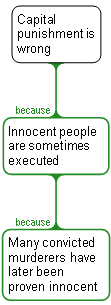The Science Of Scientific Writing Set 1 Set 1-Argument Parts : Second Page : Third Page : Example : Exercise 1 : Exercise 2 : Exercise 3 : Exercise 4 : Exercise 5 : Final Page - Set 1.
OVERVIEW: The way to well-written science
PART I: Paragraphs and Sentences
SET A: Paragraphs: The Maps Behind Them
SET B: Paragraphs: Using Maps to Meet Readers' Expectations
SET C: Paragraphs with Something Extra: Points and Tails
SET D: The Generic Section: Expectations and Maps as Blueprints
SET E: Scientific Sections: The Methods and Results
SET F: Scientific Sections: The Discussion
SET G : Scientific Sections: The Introduction
SET H : Sentences
SET I : The Paper as a Whole
PART II: The Paper and its Sections
SET 1: Argument Parts
SET 2: Indicator Words
SET 4: Locating Arguments in Prose
SET 5: Rationale's Essay Planner
SET 6: Evidence in Arguments: Basis Boxes
Synthesis 1: Position-Early Paragraphs
Synthesis 2: Position-Final Paragraphs
Synthesis 3: Writing a Discussion I
Synthesis 4: Writing a Discussion II
Hopefully your map looked like the map on the left, rather than the one on the right.
 ---------------
---------------
Why is the map on the right incorrect? The connection between its main claim and the reason below it is itself fine: the fact that many convicted murderers later turn out to be innocent is evidence for the view that capital punishment is wrong.
It is the relationship between the middle term and the lowermost term that is problematic. The fact that innocent people are sometimes executed doesn't supply any evidence at all for the claim that many convicted murderers later turn out to be innocent (in fact it is completely irrelevant!).
Content of this page drawn in whole or part from the Austhink Rationale Exercises with permission from Austhink.